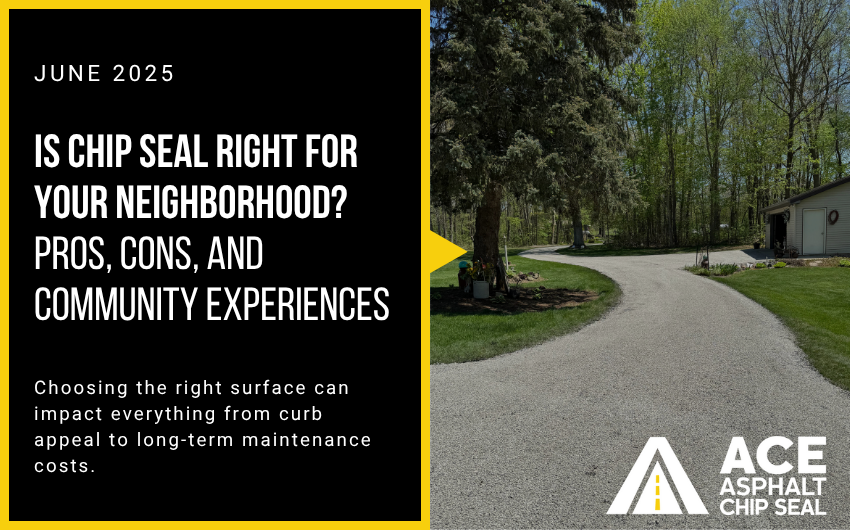Is Chip Seal Right for Your Neighborhood? Pros, Cons, and Community Experiences
When it comes to paving neighborhood roads or driveways, choosing the right surface can impact everything from curb appeal to long-term maintenance costs. That’s why many Michigan neighborhoods and HOAs are turning to chip seal as a smart alternative to traditional asphalt. This blog explores the chip seal pros and cons, real community feedback, and key considerations to help you decide if chip seal is right for your neighborhood.
What is Chip Seal? Understanding the Chip Seal Installation Process
Chip seal is a pavement method that combines hot liquid asphalt with a layer of stone chips. The asphalt binds the stones to the surface, creating a textured, protective layer. Unlike a full asphalt overlay, chip seal is applied over existing pavement or properly prepared gravel roads.
What sets chip seal apart from asphalt is its cost-efficiency, installation speed, and flexibility in application. While it doesn’t offer the perfectly smooth finish of new asphalt, its advantages in durability and maintenance make it an attractive option for many communities.
The Pros of Chip Seal for Neighborhoods and HOAs
1. Chip Seal Cost Comparison: An Affordable Paving Option
Chip seal is significantly less expensive than full asphalt replacement, making it a popular choice for HOAs and municipalities with limited budgets. It’s a cost-effective solution that still offers long-term value.
2. Extended Driveway Lifespan and Road Durability
Chip seal acts as a protective layer, sealing small cracks and preventing water penetration. This can extend the life of existing pavement by 5–7 years, delaying the need for major repairs.
3. Fast and Efficient Chip Seal Installation
With the right weather, chip seal installation can be completed in just a day or two per road segment. Roads are typically ready for use within hours, minimizing inconvenience to residents.
4. Safety Features: Traction and Visibility
The chip seal surface texture improves traction, especially in rainy or icy conditions, reducing the risk of slips and skids. It also reflects light differently, enhancing road visibility at night.
5. Aesthetic Improvements and Curb Appeal
Chip seal offers aesthetic options not often available with asphalt. HOAs can choose from a variety of stone colors and finishes to complement neighborhood style and boost curb appeal. Please note that color options are dependent on location and season.
The Cons of Chip Seal: What to Consider Before Paving
1. Loose Gravel and Temporary Debris
In the days following application, loose stone chips may be present.
2. Rougher Surface Texture
Unlike asphalt, chip seal has a coarser finish. While some homeowners prefer a smooth feel, others appreciate the grip and durability the texture provides.
3. Occasional Maintenance Needs
Routine chip seal maintenance tips include sweeping and occasional patching. These tasks are minimal and far less frequent than those required for gravel or deteriorating asphalt.
4. Weather Considerations for Chip Seal Projects
For the best results, chip seal should be applied during warm, dry weather when air and surface temperatures are consistently above 50°F and rising. In Michigan, this typically means scheduling projects between late spring and early fall. In Tennessee, however, the milder climate allows for ideal chip seal conditions during the fall and even winter months. Regardless of location, avoiding rainy or overly cold days is essential to ensure proper curing, strong adhesion, and long-term durability.
Chip Seal Community Feedback: Real Experiences from Neighborhoods
Many Michigan neighborhoods that have chosen chip seal report high satisfaction with the results. HOAs appreciate the cost savings and residents often comment on improved road appearance and performance.
Concerns such as dust or loose gravel were commonly addressed by following best practices during installation and providing residents with clear communication. Some HOAs recommend partnering with experienced contractors and educating residents ahead of time to ensure a smooth project.
Is Chip Seal Right for Your Community or HOA?
When evaluating chip seal for neighborhoods, consider:
- Current pavement condition
- Local traffic volume
- Seasonal weather patterns
- Budget and long-term maintenance plans
Chip seal is ideal for low- to moderate-traffic residential areas where cost, safety, and durability are priorities. It may not be the best choice for high-traffic roads or areas needing ultra-smooth surfaces.
Choose Chip Seal for a Durable, Cost-Effective Neighborhood Paving Solution
From extended lifespan and improved safety to lower costs and faster installation, chip seal offers compelling benefits for Michigan neighborhoods. While there are some short-term trade-offs, the long-term payoff in durability and value is significant.
Ready to explore chip seal for your HOA or neighborhood paving project? Contact Ace Asphalt Chip Seal today for a free community assessment and find out how we can help you create better, longer-lasting roads.
